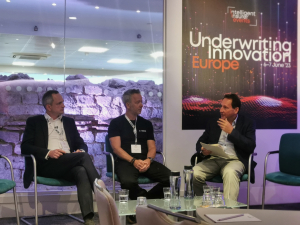
What if technology isn’t the answer? Or rather, what if technology is just part of the answer to insurance transformation?
Our industry has long sought ways to improve its processes and keep pace with the changing world. From RI3K to Blueprint 2, the market knows transformation is essential and has launched a number of multi-year programmes to achieve this.
But time after time, these programmes have either stalled, suffered significant delays or failed to realise the promised benefits. By the time one part of the plan has been delivered, the technology backing it may be obsolete, the market has changed, or the business has moved forward in a different direction leaving behind an expensive legacy of their past vision.
Having the best and latest technology is obviously an important bonus, but what’s the missing ingredient needed to ensure transformation success?
Send’s co-founder and COO Ben Huckel, and Jakub Wróblewski, London Market Practice Lead for Sollers Consulting debated this issue during a fireside session at the Underwriting Innovation Europe conference in London on 6th June, moderated by InsurTech guru Tony Tarquini.
Sollers Consulting is one of Send’s implementation partners and Jakub knows only too well how critical it is for customers to take the right approach to transformation; for him, it should “never be driven by technology”.

Truly transformational
Before getting into the nuts and bolts of business transformation. Ben and Jakub talked through some of the biggest hurdles to successful implementation facing insurers, these include:
- A lack of transparency between parties about what lies within, and outside of the programme’s scope.
- A lack of people with experience in delivering large technology transformations.
- A mismatch between what the different areas of the business want and need from the technology they’re considering.
These can be significant challenges for businesses indicating that without a broader change strategy, transformation risks failure. Ben pointed out: “You need to be able to work together to transform as an organisation. If you put new technology on top of complex processes, you’ll end up with complex technology. You have to consider business transformation in the truest sense of the word.”
Collaboration and breaking the mould
When discussing the solutions for these hurdles, Ben and Jakub agree that partnerships and collaboration are vital, both between vendor and customer, and within the customer’s business.
If we’re trying to implement wholesale business change, the views of all key stakeholders, from underwriting assistants to technology leaders need to be taken into consideration. Jakub asserts that in this respect: “we need to double our efforts to bring these people to the table”, or risk innovating in disparate silos.
The long-term partnership between vendor and customer is also key. In reality, the objectives set at the start of a project rarely remain unchanged by the end, no matter the length of the project. To underline this point, Ben highlighted the work Send had done to deliver its Underwriting Workbench to a major global insurer, he explained: “the customer set out with some very specific objectives, then 6-9 months after they started getting data and began to see what they could achieve with it, their focus changed. Businesses need to be able to adapt along the life of the project, and they need to work with a platform and a provider that can easily facilitate this.”
Change in scope is inevitable, and Jakub agreed that an open and transparent relationship between parties is important to react quickly to any movements in the goalposts:
“Often projects fail because the parties haven’t spent enough time clarifying and defining the needs of the business meaning that no one really has clear expectations of the outcome of the programme.
As the project progresses, we have to be very transparent with each other. If we can do that, we can focus on delivering real value instead of just fulfilling the requirements that were identified at the beginning.”
To do this, both highlighted the importance of breaking the traditional vendor / customer mould, something Send has concentrated on when working with partners such as Sollers. We believe that to deliver service as promised, we need to be working towards aligned goals and with complete transparency.
The courage to fail
During the panel preceding this session, ‘courage to fail’ was discussed as a clear factor enabling better transformation in the insurance industry. Christine Kaaz, Chief Underwriting Officer at ERGO, stated that the “moment of truth is in failure”, and that businesses needed to give their teams a space of “psychological safety”, where they can learn by trying, and learn from their mistakes.
This fail-fast principle is key to delivering successful business change. To achieve this however, we need to move away from the multi-year programme, which in reality, according to Ben, typically doesn’t deliver a lot, as by the time the programme ends, the requirements are likely to have changed, or the business has lost sight of the original goals.
“The reality is, there’s a real truism in getting stuff into a live environment. This is where the business can begin to realise the benefits of the system, identify new opportunities and capabilities, and focus in on the changes that need to be made.”
It became clear throughout the course of the session that transformation has to be led by business objectives. The session closed with the following final thoughts:
From Ben: “Transformational change requires partnership at all levels”, and from Jakub: “Never let transformation be a tech-driven process”.
As a technology vendor, Send, along with our own implementation partners, is committed to taking a business-first approach to transformation.
Find out more about the Send Underwriting Workbench here and learn more about our partnership approach with Sollers here.